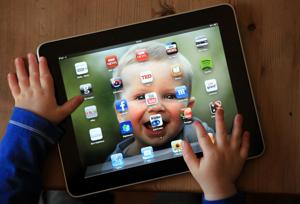Education
Toronto Study Tracks Impact of Screen Time on Children’s Test Scores

Researchers from SickKids and St. Michael’s Hospital in Toronto have conducted a comprehensive study over a span of 15 years to analyze the influence of screen time on academic performance among children. The study focused on over 3,000 children, aiming to understand how early exposure to screens before the age of 8 correlates with their results on standardized tests.
The findings revealed significant insights into the relationship between screen time and educational outcomes. The researchers observed that children who engaged with screens for extended periods showed varied performance levels in school assessments. This highlights the critical nature of monitoring children’s screen time, especially during formative years when cognitive skills are developing.
Longitudinal Study Uncovers Key Trends
The longitudinal study tracked children from their early years into adolescence, providing a unique perspective on how their screen habits evolved. Parents reported their children’s screen usage, including time spent on devices such as televisions, tablets, and smartphones. The study’s researchers aimed to identify patterns that emerged over the years and to correlate those patterns with academic performance metrics.
As children progressed through school, the results indicated that excessive screen time could negatively impact their ability to perform well on tests. Specifically, children who spent more than two hours daily on screens were associated with lower scores in mathematics and reading comprehension during assessments. The study emphasized the importance of balanced screen exposure and its potential ramifications for educational success.
The Importance of Balanced Screen Time
The implications of this research are far-reaching, particularly for parents and educators. Understanding the effects of screen time on learning can guide families in establishing healthier media consumption habits. The study advocates for a balanced approach to screen time, suggesting that interactive and educational content may yield better outcomes compared to passive viewing.
In the context of increasing digital engagement, the authors of the study encourage stakeholders, including parents, educators, and policymakers, to consider strategies that promote beneficial screen usage. This could involve setting limits on recreational screen time or incorporating educational applications that enhance learning.
The findings from SickKids and St. Michael’s Hospital serve as a crucial reminder of the role that technology plays in children’s lives. As screen time becomes an integral part of childhood, ongoing research will be essential to fully understand its long-term effects on learning and development.
Ultimately, this study sheds light on the delicate balance between technology and education, urging a thoughtful approach to screen time to foster better academic outcomes for future generations.
-

 Science3 months ago
Science3 months agoToyoake City Proposes Daily Two-Hour Smartphone Use Limit
-

 Health4 months ago
Health4 months agoB.C. Review Reveals Urgent Need for Rare-Disease Drug Reforms
-

 Top Stories4 months ago
Top Stories4 months agoPedestrian Fatally Injured in Esquimalt Collision on August 14
-

 Technology3 months ago
Technology3 months agoDark Adventure Game “Bye Sweet Carole” Set for October Release
-

 World3 months ago
World3 months agoJimmy Lai’s Defense Challenges Charges Under National Security Law
-

 Lifestyle4 months ago
Lifestyle4 months agoVictoria’s Pop-Up Shop Shines Light on B.C.’s Wolf Cull
-

 Technology3 months ago
Technology3 months agoKonami Revives Iconic Metal Gear Solid Delta Ahead of Release
-

 Technology3 months ago
Technology3 months agoApple Expands Self-Service Repair Program to Canada
-

 Technology3 months ago
Technology3 months agoSnapmaker U1 Color 3D Printer Redefines Speed and Sustainability
-

 Technology3 months ago
Technology3 months agoAION Folding Knife: Redefining EDC Design with Premium Materials
-

 Technology4 months ago
Technology4 months agoSolve Today’s Wordle Challenge: Hints and Answer for August 19
-

 Business4 months ago
Business4 months agoGordon Murray Automotive Unveils S1 LM and Le Mans GTR at Monterey









